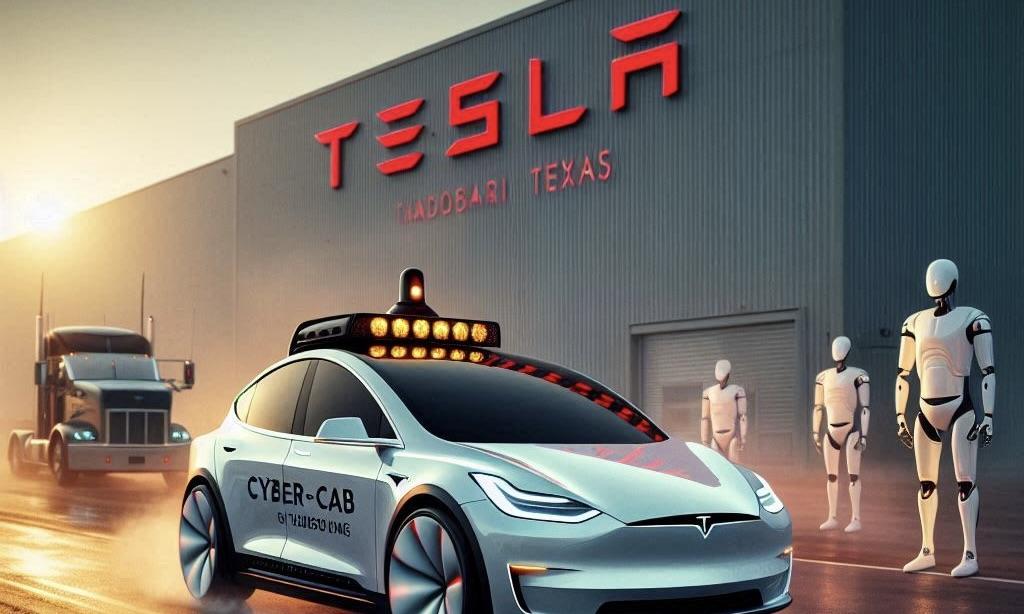Tesla's Cybercab robotaxi has been spotted on private roads at Gigafactory Texas, marking a significant step in the company's autonomous vehicle testing. This test comes as Tesla pushes toward its goal of launching an unsupervised self-driving system by 2026. The relaxed Texas regulations make it an ideal testing ground.
Tesla Unveils Cybercab at Warner Bros. Studio Lot to Showcase Self-Driving Robotaxi Fleet
Tesla has been spotted testing its Cybercab robotaxi on the roads at Gigafactory Texas. This is notable given the limited locations where the company can test the steering-wheel-less vehicle, per Electrek.
When Tesla first unveiled the Cybercab last month, it chose to do so at the Warner Bros. studio lot, a decision made for strategic reasons. Tesla aimed to demonstrate what a self-driving robotaxi fleet could look like in an urban environment. While the studio lot mimics a small city, it consists entirely of private roads, which was crucial since Tesla has yet to seek permits for self-driving vehicle tests. Instead, the company relies on its "supervised Full Self-Driving" system, classified as a level 2 driver assist system where the driver always remains responsible for the vehicle.
This setup allows Tesla to test its system in its existing vehicles, but the Cybercab presents a different challenge, as it lacks a steering wheel and pedals altogether.
Tesla Tests Cybercab on Gigafactory Texas Roads as Company Moves Toward Unsupervised Self-Driving
Tesla has now been spotted testing the Cybercab on private roads at Gigafactory Texas in Austin. While some of the streets on the Gigafactory campus are private, Texas has more relaxed autonomous driving regulations than California, where Tesla initially unveiled the vehicle. In Texas, permits are not required for autonomous cars, making it an ideal location for testing Tesla's Cybercab.
Tesla has long avoided testing its self-driving technology in California due to the state's stringent data reporting rules for autonomous vehicles. During Tesla’s last earnings call, CEO Elon Musk and head of self-driving, Ashok Elluswamy, shared that the company aims for its Supervised FSD system to reach over 600,000 miles between disengagement by Q2 2025. At that point, Tesla plans to roll out its unsupervised self-driving system, which will precede the debut of Cybercab in the 2026 market.
While this is Tesla's ambitious goal, current data suggests the company is achieving approximately 190 miles between critical disengagements.



 Amazon’s $50B OpenAI Investment Tied to AGI Milestone and IPO Plans
Amazon’s $50B OpenAI Investment Tied to AGI Milestone and IPO Plans  Trump Media Weighs Truth Social Spin-Off Amid $6B Fusion Energy Pivot
Trump Media Weighs Truth Social Spin-Off Amid $6B Fusion Energy Pivot  xAI’s Grok Secures Pentagon Deal for Classified Military AI Systems Amid Anthropic Dispute
xAI’s Grok Secures Pentagon Deal for Classified Military AI Systems Amid Anthropic Dispute  Pentagon Weighs Supply Chain Risk Designation for Anthropic Over Claude AI Use
Pentagon Weighs Supply Chain Risk Designation for Anthropic Over Claude AI Use  Greg Abel’s First Berkshire Hathaway Shareholder Letter Signals Continuity, Caution, and Capital Discipline
Greg Abel’s First Berkshire Hathaway Shareholder Letter Signals Continuity, Caution, and Capital Discipline  OpenAI Hires Former Meta and Apple AI Leader Ruomin Pang Amid Intensifying AI Talent War
OpenAI Hires Former Meta and Apple AI Leader Ruomin Pang Amid Intensifying AI Talent War  FCC Approves Charter Communications’ $34.5 Billion Acquisition of Cox Communications
FCC Approves Charter Communications’ $34.5 Billion Acquisition of Cox Communications  Middle East Airspace Shutdown Disrupts Global Flights After U.S.-Israel Strikes on Iran
Middle East Airspace Shutdown Disrupts Global Flights After U.S.-Israel Strikes on Iran  Microsoft Gaming Leadership Shake-Up: Phil Spencer Retires, Asha Sharma Named New Xbox CEO
Microsoft Gaming Leadership Shake-Up: Phil Spencer Retires, Asha Sharma Named New Xbox CEO  Flare, Xaman Roll Out One-Click DeFi Vault for XRP Yield via XRPL Wallets
Flare, Xaman Roll Out One-Click DeFi Vault for XRP Yield via XRPL Wallets  FedEx Faces Class Action Lawsuit Over Tariff Refunds After Supreme Court Ruling
FedEx Faces Class Action Lawsuit Over Tariff Refunds After Supreme Court Ruling  Synopsys Q2 Revenue Forecast Misses Expectations Amid China Export Curbs and AI Shift
Synopsys Q2 Revenue Forecast Misses Expectations Amid China Export Curbs and AI Shift  Paramount Skydance to Acquire Warner Bros Discovery in $110 Billion Media Mega-Deal
Paramount Skydance to Acquire Warner Bros Discovery in $110 Billion Media Mega-Deal  Samsung Electronics Stock Poised for $1 Trillion Valuation Amid AI and Memory Boom
Samsung Electronics Stock Poised for $1 Trillion Valuation Amid AI and Memory Boom  Coupang Reports Q4 Loss After Data Breach, Revenue Misses Estimates
Coupang Reports Q4 Loss After Data Breach, Revenue Misses Estimates  Hyundai Motor Plans Multibillion-Dollar Investment in Robotics, AI and Hydrogen in South Korea
Hyundai Motor Plans Multibillion-Dollar Investment in Robotics, AI and Hydrogen in South Korea  BlueScope Steel Shares Drop After Rejecting Revised A$15 Billion Takeover Bid
BlueScope Steel Shares Drop After Rejecting Revised A$15 Billion Takeover Bid 































